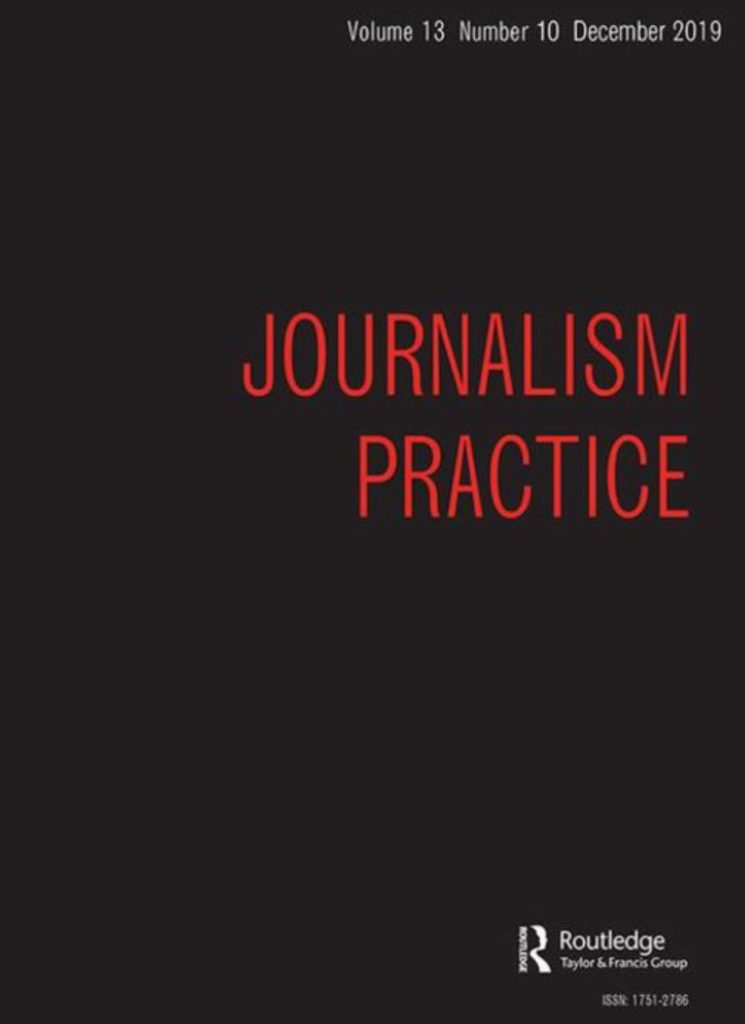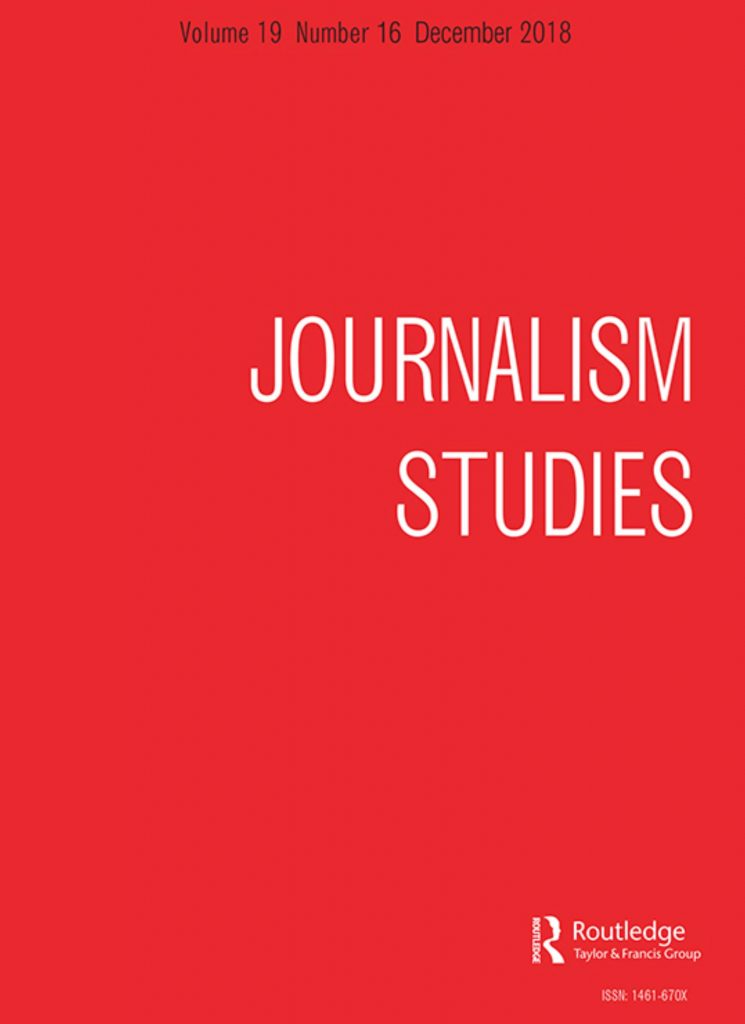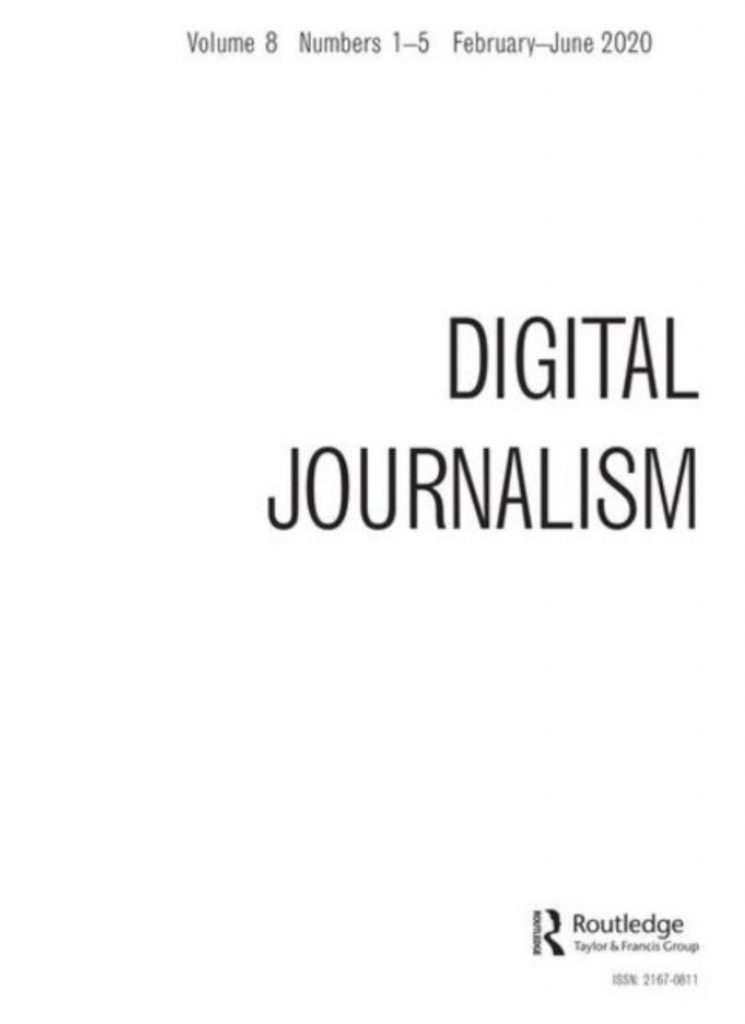
Note: This schedule may be changed in the run up to the conference.
Day 1 – Thursday 14th September
8.30am – Registration (Coffee & Breakfast)
9.15am – Welcome (Dr. Matt Walsh & Dr. Savyasaachi Jain)
9.30am – Dr. Valérie Bélair-Gagnon, University of Minnesota
The Problem of Platforms: Adopting a Critical Stance in Digital Journalism
10.30 – Coffee Break
11.00am – Breakout One
| Room 1.05 | Room 1.06 | Room 1.07 | Room 1.08 | Room 1.09 | Room 1.10a | Room 1.10b | Room 2.18 |
| Adopting A.I (1) Chair: John Jewell | Ukraine and War Reporting Chair: Stuart Allan | Journalist Safety Chair: Damian Carney | Harassment of Journalists Chair: Cynthia Carter | Climate Change Chair: Mike Berry | Covid Chair: Stephen Cushion | Solutions Journalism Chair: Diana Garrisl | Working Conditions for Journalists Chair: Matt Walsh |
| To procure or not procure: improving the conditions for journalistic AI adoption from external technology providers – Dr. Stanislaw Piasecki, Prof. Natali Helberger Journalism students’ views on AI innovation and responsibility: Findings from a Design Thinking project in Germany – Dr. Bartosz Wilczek, Dr. des. Maximilian Eder, Dr. Roxana Portugal, Prof. Neil Thurman, Prof. Mario Haim Defining responsible AI in journalism: Reporters’ perceptions on automated decision-making and algorithmic bias – Dr. Tomas Dodds, Dr. Astrid Vandendaele, Mathias-Felipe de-Lima-Santos Revisiting News Automation’s Narratives and Practices: A Case Study of the Use of AI-driven Tools in (Non-Western) Newsrooms – Dr. Rana Arafat, Dr. Glenda Cooper | Criminalizing independent journalism: the media war during Russia’s invasion of Ukraine – Dr. James Rodgers Crisis journalism as a pawn in the disinformation war? An automated content analysis of news media coverage on the Russian Invasion and its discussion in counterpublics – Svenja Boberg, Johanna Klapproth, Prof. Thorsten Quandt Journalism in Crisis: Lessons of Challenge, Strategy and Leadership in Local News Sustainability in Ukraine during the War with Russia – Marisa Porto Aiming to See Through The Fog of War: The Role of the New Surveillance Technologies in War Reporting – Dr. Markus Mykkänen, Associate Prof. Turo I Uskali, Prof. Antero Holmila, Pasi S Ikonen | A global index on journalists’ safety – Dr. Vera Slavtcheva-Petkova, Prof. Thomas Hanitzsch, Prof. Basyouni Hamada, Prof. Jyotika Ramaprasad, Prof. Kenneth Andresen Life in Exile: Risks and Challenges for Refugee Journalists – Dr. Sanem Şahin Mapping violence and targeted journalistic identities in Belgium – Prof. Manon Libert, Prof. Florence Le Cam, Dr. Bart Vanhaelewyn, Prof. Sarah Van Leuven, Prof. Karin Raeymaeckers Silence, Complicity, or Confrontation: A Comparison of Mexican and U.S. Press Coverage of Mexican Journalist Killings – Dr. Jennifer Henrichsen, Elizabeth Chambers | Exploring Organisational Response to Dark Participation: Corporate Responsibility and Online Safety for Journalists – Dr. Kelly Fincham The worst time to be a journalist in Lebanon: Implications of a decreasing sense of security on journalists’ role perceptions – Sally Farhat, Dr. Linda Steiner, Dr. Jad Melki ‘An Ally to Women Journalists.’ How Media Interlopers Help Journalists Navigate Dark Participation – Dr. Jacob L Nelson, Dr. Valérie Bélair-Gagnon, Dr. Avery Holton Hate speech against journalists on social media in Spain – Dr. Simón Peña-Fernández, Dr. Ainara Larrondo-Ureta, Ángela Alonso-Jurnet | Seasonal Journalism and Climate Change – Henrik Bodker Global issue, global coverage? International relations framing in national reporting on climate change – Merle van Berkum Crisis coverage in journalism and counterpublics: Analyzing the shift of climate change narratives in polarized news flows – Johanna Klapproth, Saïd Unger | Why do we want news? Analysing news’ democratic desirability during Covid-19 – Dr. Imke Henkel, Prof. Tim Markham Press-state relationship in the time of the COVID-19 pandemic: An ethnography study of three Indonesian news organisations – Endah Saptorini Digital Courts and Journalism: Implications for Open Justice – Dr. Sally Reardon, Dr. Bernhard Gross, Dr. Tom Smith, Marcus Keppel-Palmer ”For three months, I tried to watch the news, but then I realised that I was going crazy.” Emotions and affective practices shaping trust in Covid-19 news reception – Dr. Salla Tuomola, Prof. Jaana Hujanen, Dr. Katja Lehtisaari, Juho Ruotsalainen, Mikko Grönlund | The Boundaries Within the Field: A Qualitative Approach to Constructive Journalism – Birte Leonhardt, Dr. Diego Garusi Incorporating solutions journalism into local UK newsrooms: Toward a model of ‘SOJO lite’? – Prof. Daniel Jackson, Dr. Antje Glück, Prof. An Nguyen Volunteer Journalism: An Underexplored Sub-field of Journalism – Dr. Nick Mathews, Dr. Lene Heiselberg, Pranaav Jadhav In the line of Fire! Conflict Reportage; Kenya’s War on Terror Narratives – Loise Macharia, Dr. Marguerite Barry | Vernacular journalism: Local news and everyday life – Prof. Karin Wahl-Jorgensen, Dr. Julia Boelle Troubled times for journalists: The impact of job insecurity, workload and external pressure on professionals’ mental health – Dr. Dolors Palau Sampio, Dr. Maria Iranzo-Cabrera Happy Journalism Unions in Troubled Times: Communicating Newsworkers’ Job and Life Satisfaction – Dr. Errol Salamon Exploring the Infrastructure of Journalism Work in the Global South – Dr. Ruth Moon, Dr. Will Mari |
12.30pm – Lunch
1.30pm – Professor Jane Singer, City, University of London
‘The Past Is Prologue: The Future of Journalism Studies’
2.30pm – Breakout 2
| Room 1.05 | Room 1.06 | Room 1.07 | Room 1.08 | Room 1.09 | Room 1.10a | Room 1.10b | Room 2.18 |
| Trust in News Chair: Justin Lewis | Adopting A.I. (2) Chair: Matt Walsh | Boundary Work Chair: Marcel Broersma | Polarisation (2) Chair: James Rodgers | Collaboration in journalism and education Chair: Inaki Garcia-Blanco | Disinformation Chair: Stephen Cushion | Social Media Chair: Stephanie Edgerly | Podcasting & Immersive Journalism Chair: Sali Collins |
| Trust in News Falls as Social Media Grows and Television Declines: Longitudinal Data from 46 Countries – Dr. Richard Fletcher, Dr. Simge Andı, Dr. Sumitra Badrinathan, Dr. Kirsten Eddy, Dr. Antonis Kalogeropoulos, Dr. Camila Mont’Alverne, Dr. Craig T. Robertson, Dr. Amy Ross Arguedas, Dr. Anne Schulz, Dr. Benjamin Toff, Prof. Rasmus Kleis Nielsen ‘Money is the root of all evil.’ How the business of journalism shapes trust in news – Dr. Seth C. Lewis, Dr. Jacob L. Nelson, Brent Cowley Understanding audience expectations of journalism in troubled times – Prof. Julie Firmstone, Prof. John Steel How can regulation help news publishers earn public trust? – Hamish Gibson, Lexie Kirkconnell-Kawana | Audience evaluations of data-driven local news articles made with various levels of automation, and none: A large-scale survey experiment – Prof Neil Thurman, Dr. Florian Stalph, Sina Thaesler-Kordonouri The news conveyor belt. Intensities of automation and data micro-processes in Nordic newsrooms – Dr. Raul Ferrer-Conill, Carina Tenor, Carl Chineme Okafor Conceptualising Augmented Journalism – Prof. Carl-Gustav Linden, Mariëlle Wijermars, Prof. Andreas Opdahl, Dr. David Caswell | Boundary-work in the Nordic media model: A comparative analysis of institutional responses to alternative media in Norway, Sweden and Denmark – Leif Hemming Pedersen, Karoline Andrea Ihlebæk, Tine Ustad Figenschou, Eva Mayerhöffer Navalny as an Interloper? Hybrid journalistic projects in contemporary autocratic Russia – Dr. Sofya Glazunova, Dr. Aljosha Karim Schapals Competition or Complementation? Exploring relational boundary strategies of traditional and peripheral actors – Kim Löhmann, Dr. Phoebe Maares, Dr. Daniel Nölleke, Folker Hanusch “TikTok News Non-Logic”: An Analysis of Audience Responses to the Washington Post’s Delivery of News on TikTok – Damilola Oduolowu, Vy Luong, LaRissa Lawrie | The Fight for Press Freedom: International Advocacy Campaigns and Journalists in the Global South – Dr. Martin Scott, Prof. Mel Bunce, Dr Mary Myers Diversity for what? An analysis of normative democratic assumptions in the domain of personalized news recommender systems – Prof. Jannie Møller Hartley, Elisabetta Petrucci String Quartet on the Titanic: Are U.S. journalists covering their own demise or rowing to safety with democracy’s own beat? – Dr. Karin Assmann BBC “bias”: an empirical study into press and political influence on BBC political programmes – Prof. Steven Barnett, Prof. Ivor Gaber | Going Global: Virtual Collaborations within Journalism Education – Katherine Blair, Dr. Carolyn Jackson-Brown, Leigh Purves Networked journalism: the rise of European Journalism partnerships – Dr. Elvira García de Torres, Dr. David Parra Valcarce, Dr. Concha Edo Bolós, Dr. Lyudmyla Yezers´ka Teaching Cross-Border Collaboration in Journalism Education by replicating collaboration in the Panama Papers – Prof. Maria Konow-Lund Materializing (the boundaries of) creativity: Journalism and and the communicative patterns of creative teamwork – Minna Koivula, Dr. Salla-Maaria Laaksonen, Dr. Jukka Huhtamäki, Dr. Kaisa Laitinen | WhatsApp with the News: Non-Professional WhatsApp News Groups and Digital Prodnewsers in the Era of News Mobility – Dr. Jonathan Ilan Repairing deviant journalistic practice: The Dupont de Ligonnès case – Pauline M Renaud “We should do more than publish and pray”: Fact Checkers on getting truth to the people – Dr. Emily K. Vraga, Dr. Leticia Bode Fighting or promoting? The role of journalists in the spread of disinformation – Pedro Jerónimo, Luísa Torre, Aline Grupillo | Avoiding the flag. Exploring Snapchat´s gatekeeping dynamics in the newsroom – Heidi Rosok-Dahl, Dr. Ragnhild Kristine Olsen Reconsidering mediated distant suffering in a context of news avoidance: A social media users’ perspective – Gabriela Müggenburg, Dr. María Luengo Journalists’ Ideological Branding: Bridging Between Professional and Personal Branding on Twitter – Arnon S Kedem, Prof. Motti Neiger Rethinking Social Media Affordances and Online Reaction to News Coverage: A Case Study of the Death of Mahsa Amini and Iranian Protests – Dr Lindsey E. Blumell, Sanam Mahoozi, Dr. Rana Arafat | Challenges facing the Podcast journalism in Vietnam – Anh Dinh-Hong “This is What the News Should Sound Like”: The Discursive Construct of News Podcast as an Innovative Genre by Practitioners on Metajournalistic Podcasts – Maxwell Modell Intimate podcasting in Switzerland: evolving patterns of sourcing and expertise in journalism – Cécile Détraz An Additional Layer of Understanding? The Impact of Interactive Immersive Journalism on Information Processing – Hannah Greber, Prof. Sophie Lecheler1, Dr. Loes Aaldering |
4.00pm – Coffee Break
4.30pm – Breakout 3
| Room 1.05 | Room 1.06 | Room 1.07 | Room 1.08 | Room 1.09 | Room 1.10a | Room 1.10b |
| Conflict in News Chair: John Jewell | Using Drama in News Chair: Gregory Perreault | Using A.I. Chair: Diana Garrisi | Disinformation (2) Chair: Maria Kyriakidou | Social Media (2) Chair: Mike Berry | Diversity and Gender Chair: An Nguyen | Young People and News Chair: Cynthia Carter |
| Friends like these: The normative relocation of conflict journalism – Dr Robert Sharp, Dr Richard Stupart Political Crisis Reporting in a Hybrid Media Environment: How Citizen Journalists and Legacy Media Report on Cameroon’s Anglophone’s Crisis – Edwin Tamfuh Nfor News characteristics, newsworthiness and sharing news during a violent authoritarian movement – Dr. Marcos P. Da Silva, Dr. Rachel R. Mourão, Dr. Tim P. Vos, Marialina Antolini, Leilane Menezes | The drama of journalism: the benefits and pitfalls of combining journalists and actors to produce live performance – Dr Glenda Cooper, Catherine Adams What role can Theatre Reportage play in the mediation of unbiased reporting? Dr. Carrie Westwater | Six Uses of Generative AI in the Newsroom: Mapping Journalist’s Perceptions of Perils and Possibilities of Generative AI-Tools – Dr. Hannes Cools Escape Me If You Can: How AI Reshapes News Organisations’ Dependency on Platform Companies – Felix M Simon What comes after the algorithm? An investigation of journalists’ aims and practices when editing stories produced with automation – Sina Thäsler-Kordonouri “Not wasting heat on the crows” – rationalizing news production in Swedish legacy news institutions – Carina Tenor, Joanne Kuai | Assessing the role of news media in the spread and impact of disinformation – Dr. Jaume Suau, Dr. Elena Yeste Filling the gap? When non-journalists produce and fact-check – Dr. Aline Grupillo Reis The Impact of Fact-Checking. A distribution analysis of political fact-checking during the 2021 parliamentary election in Norway – Prof. Bente Kalsnes, Prof. Steen Steensen | What feels like news? Young people’s perceptions of news(-ness) on Instagram – Dr. Joëlle Swart, Prof. Marcel Broersma An obituary for an Iranian actress, naked cyclists for the environment, and tragic 9-11 commemorative photos: An analysis of news values in global news publishers’ most engaging Instagram posts – Dr. Julian Maitra, Dr. Patric Raemy, Lydia Cheng, Matthew Chew African Journalists’ Use of Social Media and Editorial Policies Informing News Reporting – Dr. Ammina Kothari, Dr. Sally Ann Cruikshank How young people experience news on TikTok. Understanding how news organizations can stand out on TikTok with valuable journalism and be meaningful to young audiences – Prof. Irene Costera Meijer, Dr. Kenza Lamot, Dr. Tim Groot Kormelink | How marginalised and underserved audiences across the Global North and South perceive symbolic representation in newsrooms and news coverage – Dr. Amy A Ross Arugedas, Dr. Sayan Banerjee, Dr. Camila Mont’Alverne, Dr. Benjamin Toff, Dr. Richard Fletcher, Dr. Rasmus Kleis Nielsen Toward more equitable local news: the role of meta-organizations – Dr. Andrea D Wenzel We just seek this traffic gold’ – Journalistic challenges for Muslim Representations in the digital age – Dr Nadia Haq Gatekeeper, Gate-watcher or Gate-escaper? Perceptions of online ‘Gatekeeping’ by Chinese TV Journalists – Dr. Yuxin Liu | What is journalism? Young adults’ folk theories – Diego Garusi, Prof. Sergio Splendore Digital Media Ecosystems: An analysis of Generation Z news consumption, its impact on evolving concepts and applications in journalism – Bethany Wood Examining the Affective Responses and Engagements of Young Adult Nigerians from Low-Income Communities with Legacy Media News Reports – Dr. Olutobi Akingbade Relevance of automated journalism and estimations of future journalists – Victoria Ertelthalner, Dr. Cornelia Wallner |
7.30pm – Dinner: Royal Welsh College of Music and Drama




